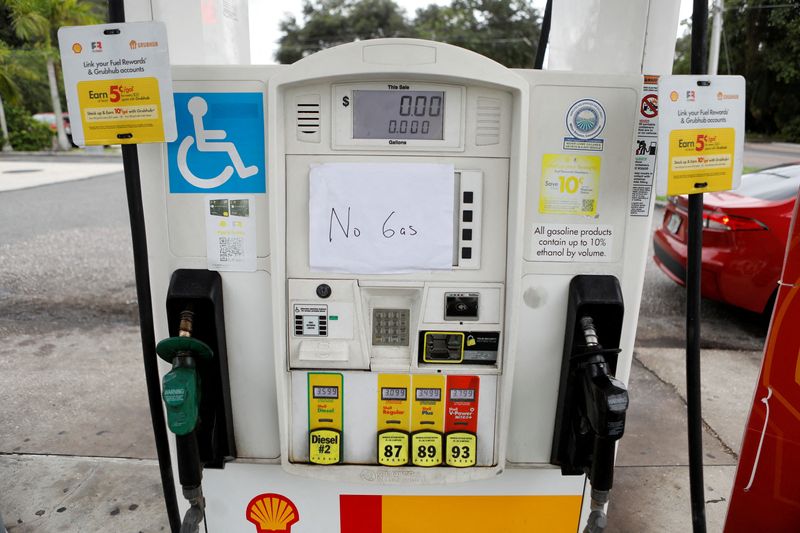
By Shariq Khan
NEW YORK (Reuters) – Nearly a quarter of fuel pumps in Florida were out of gasoline on Wednesday morning as residents rushed to evacuate ahead of Hurricane Milton’s landfall, potentially one of the most destructive ever to hit the state’s Gulf Coast.
More than a million people in Florida’s coastal areas were under evacuation orders, clogging highways and causing fuel shortages from Tampa to Orlando in a region is still reeling from the devastating effects of Hurricane Helene less than two weeks ago. Milton is expected to slam ashore in the Tampa Bay metropolitan area late on Wednesday.
Some 24% of nearly 8,000 gasoline pumps in Florida were out of fuel as of noon eastern time on Wednesday, up from over 17% the previous evening, according to market tracker GasBuddy.
Florida is the third-largest gasoline consumer in the United States, but there are no refineries in the state, making it dependent on shipments from elsewhere by land or water.
Milton’s severity and predicted path over Tampa Bay, where a bulk of the state’s fuel import and storage terminals are located, make it potentially the most devastating hit to Florida fuel markets since 1992’s Hurricane Andrew, OPIS oil analyst Tom Kloza said on Tuesday.
Significant damages to Florida’s Gulf Coast ports or fuel terminals could severely disrupt re-supply efforts after the storm passes.
A prolonged closure of the Port of Tampa Bay, which was shut for all vessel traffic on Tuesday, could severely disrupt fuel supply into western and central Florida, said Ben Ruddell, director of the FEWSION Project, which monitors domestic supply chains.
More than 17 million tons of petroleum- and natural gas-related products move through Tampa Bay in a typical year, according to the Energy Information Administration.
Kinder Morgan Inc (NYSE:KMI), Chevron Corp (NYSE:CVX), CITGO Petroleum and Buckeye Partners were among energy companies shutting down Tampa terminals to protect against damages.

Kinder Morgan also shut its Central Florida Pipeline system, two small pipelines that haul gasoline, ethanol, diesel and jet fuel from Tampa to Orlando.
Wholesale fuel distributor Mansfield moved Tampa and Orlando to its Code Blue classification, effectively suspending any fuel deliveries due to worsening conditions making roads impassable for trucks. Mansfield is keeping other Florida markets on Code Red, requiring a 72-hour notice to make fuel deliveries, it said.
This post is originally published on INVESTING.


